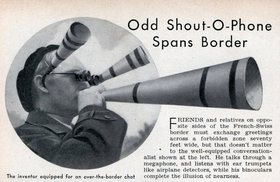 Computers can do just about everything these days, from running airplanes to carrying out labyrinthine mathematical calculations. It would seem to be such a simple thing I am asking. I would like a computer to provide me with my own voice. Many people have suggested this: “Why don’t you get someone to take tapes of your speaking voice and create a voice you can use with your computer?” They make it sound so simple. They look like they’ve had a brilliant idea. But it is not so simple.
Computers can do just about everything these days, from running airplanes to carrying out labyrinthine mathematical calculations. It would seem to be such a simple thing I am asking. I would like a computer to provide me with my own voice. Many people have suggested this: “Why don’t you get someone to take tapes of your speaking voice and create a voice you can use with your computer?” They make it sound so simple. They look like they’ve had a brilliant idea. But it is not so simple.
Two years ago, I was told by helpful computer wizards at the National Center for Supercomputer Applications at the University of Illinois at Urbana that such a thing was possible. There is even a company in Urbana that creates computer voices. But it appears it might cost me a small fortune to have one custom-created for me. Wouldn’t you think the same technology could be applied to create many voices? Apparently that’s not so easy.
Soon after my second surgery, when it became apparent I wouldn’t be able to speak, I of course started writing notes. This got the message across, but was too time-consuming for communications of any length. And notes were unbearably frustrating for a facile speaker like me, accustomed to dancing with the flow of the conversation. There is a point when a zinger is perfectly timed, and a point when it is pointless.
There is a ground rule in the treatment of those who cannot speak; their written notes must take precedence. This was not happening. Something would be said, I would begin writing a comment, and someone else would speak. Then someone else would speak. I would finish my note, and hand it to a person who was speaking. They would hold it, finish, and be responded to by someone else. When my note was finally read, I would hear, What’s this about?Or I don’t know what that means. I would point to right (the past), to suggest I was responding to something said earlier. They wouldn’t know what that meant, either. 
God knows my wife tried to help out, but people…are people. Who knows how patient I would be? One on one, conversations-by-note went all right. Business meetings were a torture. I am a quick and I daresay witty speaker. Now I came across as the village idiot. I sensed confusion, impatience and condescension. I ended up having conversations with myself, just sitting there.
One day I was fooling around with the built-in Speech program on my Mac, and started playing with some of the voices. One of the beauties of Speech for Mac is that it will speak anything on the screen–e-mail, file names, web pages, anything.
That was a godsend. Most of the voices, however, left a lot to be desired. Their voice named Fred sounded too much like someone doing a bad Paul Lynde imitation. At least, however, it was speech of a sort. I went on the web and found a company at Cepstral.com, which sells voices for downloading at $29.95. I tested the demos, and settled on Lawrence, not because he has a British accent but because he was the easiest to understand, and sounded intelligent.
Lawrence lasted me more than a year. Then I upgraded to the Leopard Mac OX operating system, and found a new Mac voice named Alex. I am using it now. Amazingly Alex, is the first voice I have yet heard that understands and reflects question marks and exclamation points!?! This prevents every sentence from being spoken in a monotone.

The built-speakers for the MacBook Pro aren’t very loud. I experimented with various small laptop speakers, such as he J-Lab BFlex which were fine, and Tweakers, also fine. But now I’m using some somewhat older but larger portable speakers, Sonia Impact, which are LOUD. I crank up the volume and butt right in, just as everyone else does. This may be rude but it’s a great relief.
But on those occasions I’ve appeared in public or on TV with a computer voice, I nevertheless sound like Robby the Robot. Eloquence and intonation are impossible. I dream of hearing a voice something like my own.
We put men on the Moon, people like to say about such desires: Why can’t I have a voice of my own? Many people don’t happen to have a lot of recordings of themselves speaking. I have countless hours. All the old TV shows have been digitized. I’ve done several DVD commentaries. There are lectures, panel discussions, Q&A sessions. But I’ve been unsuccessful in my quest. I still sound like Alex, or in certain moods like Lawrence.
But wait! There is new hope! Just this moment, searching for the Cepstral URL to link for you, I found a new company I had never before seen on the web. This is CereProc, from Scotland–from Edinburgh, in fact, that ancient center of medical learning where Dr. Jekyll did his pioneering work.

“CereProc offers a range of voices in many accents. We can create amazing new voices quickly due to our innovative voice creation system. Many of our voices are built exclusively for specific customers and applications.”
That’s me! They even supply demos of two of their custom-made voices, inspired by George W. Bush and Arnold Schwarzenegger. Their Dubya and Arnold wouldn’t fool their wives, but you can certainly tell it’s them. Alas, every one of their current retail voices–Heather, Katherine, Kirsty, Sarah and Sue–are inexplicably women. Just when you want the Scottish to be sexist, they let you down. However, their women are very well-spoken, and if CereProc had a man I would probably like him.
They offer another feature I earnestly desire. You can use AliasKeys or other text insertion shortcuts to add emotional intonations to their voices! Now it need no longer sound exactly the same when you say I love you as when you say Stick it where the sun don’t shine. Here is a table from their website:

CereProc doesn’t reveal their prices. I have my fingers crossed. I have launched an e-mail to Edinburgh with my appeal. I can see my own voice hosting online or telecast video essays. I am greatly cheered. I will keep you informed.
Here is CereProc’s home page.
The web site for the home of Lawrence, Cepstral.
George W. Bush will say anything you desire! Powered by CereProc on the Bush-O-Matic .

An earlier computer voice born in Urbana, Illinois











